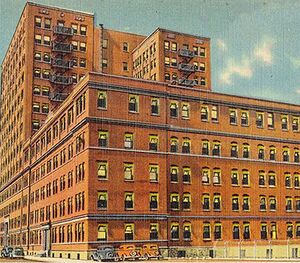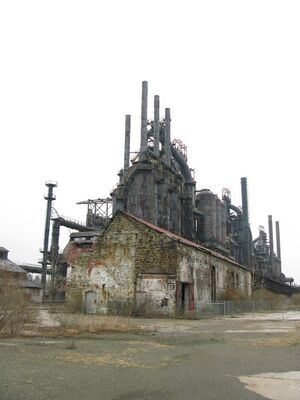Puertegan National Steel: Difference between revisions
mNo edit summary Tag: 2017 source edit |
|||
| Line 34: | Line 34: | ||
The loss of thousands of jobs resulting from the companies liquidation and the resulting recession is often listed by historians as one of the primary reasons for the Red May communist revolution of 1980, many former factories of PNS were destroyed as a result of fighting between government forced and Red May rebels, handicapping any attempts that could be made to put the factories back into working order after the Red May's victory. An attempt was made to revive PNS by the Red May administration which was supported by communist Kiravia however due to the dilapidated conditions of many of the factories the government abandoned many of their projects to repair the former mills due to the cost with only a few of the scrap recasting mini mills being put back into service. After the mini mills were refurbished the population of Puertego began to take pieces of the unused factories and sell them to the mini mills as a way to earn an extra stream of income, a practice that continues to the modern day in Puertego. | The loss of thousands of jobs resulting from the companies liquidation and the resulting recession is often listed by historians as one of the primary reasons for the Red May communist revolution of 1980, many former factories of PNS were destroyed as a result of fighting between government forced and Red May rebels, handicapping any attempts that could be made to put the factories back into working order after the Red May's victory. An attempt was made to revive PNS by the Red May administration which was supported by communist Kiravia however due to the dilapidated conditions of many of the factories the government abandoned many of their projects to repair the former mills due to the cost with only a few of the scrap recasting mini mills being put back into service. After the mini mills were refurbished the population of Puertego began to take pieces of the unused factories and sell them to the mini mills as a way to earn an extra stream of income, a practice that continues to the modern day in Puertego. | ||
{{Template:Award winning article}} | |||
[[Category:2023 Award winning pages]] | |||
[[Category:IXWB]] | [[Category:IXWB]] | ||
[[Category:Puertego]] | [[Category:Puertego]] | ||
Latest revision as of 14:59, 19 January 2024
| PNS | |
| Industry | Steel |
| Founded | July 6th, 1954 |
| Founder | Government of Puertego |
| Defunct | December 12th, 1978 |
| Fate | Bankruptcy and Liquidation |
| Headquarters | San Lina, Puertego |
Puertegan National Steel was a Puertegan steel manufacturing company founded on July 6th, 1956, by the government of Puertego and liquidated on December 12th, 1978. Puertegan National Steel, during its lifetime, was one of the largest companies in the country and at its peak was providing 66% of the total revenue for the city of San Lina. The company was founded as Puertego's first steel manufacturing company in order to reduce dependence on foreign steel imports and was initially founded as a State-owned enterprise, however over the company's lifetime the share the government of Puertego had in the company was reduced.
History

Establishment
During the early 1950's the economy of Puertego was primarily agricultural and dominated by an elite of wealthy plantation owners. However, the country was very rich in mineral reserves which at the time were only beginning to be exploited, the President of Puertego at the time Carlos Hemenes called for the country to begin pushing towards an industrial economy and called the newly extracted minerals "the building blocks of a prosperous, rich Puertego." At the time the country had no steel mills of their own and imported almost all of the steel they used from Caphiria, this increased support for the industrialization push among patriotic and nationalistic elements in the country who saw it as a way to reduce foreign influence on the economy and country and allowed for many of the policies to pass through the National Assembly including the creation of Puertegan National Steel (PNS) as an SOE.
Early Years
The company was put under the management of Samuel Freixa and initially created mini mills which turned scrap metal into steel by melting the scrap down, cleaning out any impurities, and recasting it. During the company's early years when it was only in the low-margin business of recasting scrap metal it often struggled to turn a profit and required government subsidies to stay afloat, so in an attempt to make the company turn a profit and produce better quality steel in the process the company was granted the equivalent of $40 million from the government in order to make pig iron plants and integrated steel mills. However, the devaluation of the country's currency at the time, the Mokk meant that the granted amount was insufficient for buying steel making equipment, in response to this the Samuel Freixa, in 1956, went to Caphiria and requested a loan for the company. The company was offered a loan of $62 million however multiple terms were added on such as the company only buying steel making equipment from Caphiria, requiring the company to privatize though allowing the government to retain a 51% share with them citing supposed "bureaucratic inefficiencies" though it is speculated Caphirian steel producers insisted on the term in order to protect themselves, and changing the company head though this term was eventually dropped. The terms were accepted, and the company was privatized soon with the wealthy Correa family who later bought out the whole operation. Early after privatization the company faced multiple problems such as delays in construction and failing to turn a profit with the reasons for this heavily debated on.
Alcocer Managent
In 1962 the company's head had gained the displeasure of Samuel Freixa who had loans issued by the Development Bank of Puertego foreclosed on and had the military seize the family's assets and split them among the Alcocer family and the state. The government gave the industry the responsibility of stabilizing the steel industry in Puertego, saving creditors, and keeping the thousands of jobs provided. The company began merging with close to bankrupt local steel mills which allowed them to greatly expand their steel production and granted them a virtual monopoly on the nations steel production. By 1965 the company was the nation's largest domestic corporation and by 1968 had begun exporting steel to other countries instead of saving it for domestic consumption with PNS steel liked abroad due to its very cheap price and high quality for the price.
Relations With Employees
The relationship between the company and its workers was regarded as unnaturally good especially by Puertegan standards with the company providing housing and healthcare benefits along with wages being 3.5 times higher than the average across the country at the time not accounting for the bonuses they received. The workers for PNS were considered to be in the middle class of society in Puertego and San Lina especially with wealthier sections of the city called "steeltowns" due to the large amount of PNS workers who lived there. The company also maintained good relations with its employees, the company experienced only one strike until 1973 which was dealt with peacefully and had an employee turnover of less than 1%.
Buyout and Decline
After a coup deposed President Samuel Freixa in 1972 an effort to cull the formers president's supporters began with the Alcocer family being some of the first targets, after their deaths the government auctioned off a majority share in the company to private investors and kept a 12.5% share for themselves, the majority share was eventually bought by Tharva MetalTech with the transaction finalized in December of the same year. The problems presented by this buyout presented themselves almost immediately with the new head of the company not even moving to Puertego, additionally the Tharva switched PNS's supplier of raw resources to a Kiravian company owned by Tharva's CEO causing a reduction of quantity and quality of steel produced and inflated prices to produce steel. Tharva's management of PNS was infamous for corruption, mismanagement, and deterioration of employee relations, the company began to hemorrhage money and in 1975 the company laid off workers for the first time since 1961. After another coup in 1976 the government of Puertego attempted to keep PNS afloat however soon realized that the money required for would greatly outweigh what PNS now contributed to the economy and decided against it, the government sold off the last of their shares in October of 1977 and Tharva liquidated the company's assets in December of 1978.
Attempted Revival

The loss of thousands of jobs resulting from the companies liquidation and the resulting recession is often listed by historians as one of the primary reasons for the Red May communist revolution of 1980, many former factories of PNS were destroyed as a result of fighting between government forced and Red May rebels, handicapping any attempts that could be made to put the factories back into working order after the Red May's victory. An attempt was made to revive PNS by the Red May administration which was supported by communist Kiravia however due to the dilapidated conditions of many of the factories the government abandoned many of their projects to repair the former mills due to the cost with only a few of the scrap recasting mini mills being put back into service. After the mini mills were refurbished the population of Puertego began to take pieces of the unused factories and sell them to the mini mills as a way to earn an extra stream of income, a practice that continues to the modern day in Puertego.